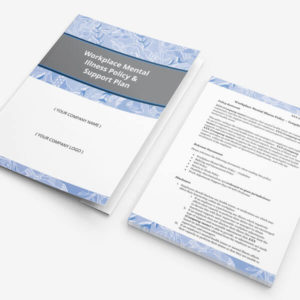If an employee has mental health issues are you likely to know about it? Do they have to disclose mental illness?
Employee Disclosure
This is a complex area where essentially if the illness is affecting an employee’s functioning (and their capacity to perform the core requirements of their job), then it is considered that they do have a responsibility to disclose the illness to their employer.
However, many employees will still choose not to if they don’t feel that it is socially safe to do so.
The reasons why employees do not disclose mental health issues can be very simple, such as they feel that it’s not affecting their work performance and therefore is no one else’s business. Or the reasons can be quite complex in that it can be a mixture of previous negative reactions and therefore fear of discrimination, coupled with self-stigma or even lack of awareness of how badly their performance is being affected.
Many employees do report receiving negative responses to their disclosure, however, others report that they felt they were treated well and fairly. Often employees will not disclose unless they feel it is socially safe to do so.
How do organisations tackle this issue?
The first step is to acknowledge that mental health is an important part of general health and as such you will have employees who are affected at times. Then understand that not all employees with mental health issues will be impacted in their work functioning, but if they are then it is important that they feel safe to disclose their issues.
This way the employer can work with the employee to meet their obligations to them and other employees, and provide appropriate support while still managing the organisation’s needs.
When implemented, appropriate strategies can greatly improve an organisation’s culture of mental health and wellbeing, to the point where employees feel that it is safe to disclose any mental health issues and get any support they may need.
It is not enough to talk about mental health and wellbeing on sanctioned days such as RUOK Day or during Mental Health Week. Creating a culture that encourages appropriate disclosure requires positive and proactive attention to raise awareness throughout the year. Awareness must then be supported by a deliberate strategy to increase the skills of leaders to have suitable conversations about mental health concerns and to respond appropriately to any disclosure.
Tap into our mental health expertise
Privacy and confidentiality
Supervisors and managers need to understand their obligations around privacy and confidentiality. If an employee discloses, or a manager suspects that a person is experiencing mental health issues, then the supervisors need to be conscious of only disclosing this information on a need-to-know basis.
They may choose to forward the information up the supervisory chain (i.e. to their own manager) and to their Human Resources’ staff, however they have to be very cautious not to disclose it to others who do not have any responsibility in the situation.
This is true even when reasonable adjustments are made to support the employee. The adjustments may be visible and obvious to the employee’s colleagues, so the supervisor needs to work with the employee to determine a communication strategy that the employee is comfortable with in terms of what is disclosed to colleagues.
Adjustments to enhance inclusion
Many leaders implement workplace adjustments to support employees to overcome limitations and barriers caused by physical injuries or impairments.
Designing and implementing reasonable adjustments are not only important to consider in order to meet obligations around non-discrimination, they are also important for helping to enhance inclusion and participation for a range of diverse needs.
Adjustments can help us to create more inclusive workplaces by overcoming the barriers that may have been designed by a history of how, where or when work has been traditionally done. However, many leaders report they are not sure how to do this for mental health issues.
Research indicates that 1 in 5 of us will experience mental illness in a year, and up to half of us in our lifetime. This high prevalence means mental health issues are certainly present in your workforce and therefore need to be considered when creating inclusion and diversity initiatives.
Reasonable adjustment/accommodation are supports or modifications made to an employee’s work conditions, work environment or work tasks to assist the person to overcome the functional impacts of their mental illness and to maintain their employment. The reasonability test requires that implementing the adjustment would not cause undue hardship to the organisation. [1]
Under disability discrimination laws in Australia, organisations are required to consider possible adjustments to assist a person to overcome any functional impacts they experience from a range of issues, including mental health issues.
Having mental health issues doesn’t automatically mean a person will experience disabling impacts. For some, there will be no visible impacts in the workplace, however, if there is, employers are required to assess the employee’s needs in the context of their role and the organisation’s capacity to adjust.
Making reasonable adjustments to the everyday work tasks of someone who is experiencing mental health issues is an important way to both connect with and support your employee’s needs and to meet your obligations.
Supervisors and managers need to have a broad understanding of the most common mental illnesses and their possible functional impacts in the workplace so that when they identify these impacts, they will be able to meet their obligation to implement reasonable adjustments where possible. When designing reasonable adjustments, we must balance the organisation’s operational needs (including possible impacts on other employees) with the needs of the individual employee.
Simple model for adjustments
This simple model can assist in designing and implementing reasonable adjustments:
Design
- Analyse (the core requirements of the job – e.g. key tasks, workflow issues, seasonal variations, KPIs, location/work area issues, etc.)
- Assess (the employee’s functional capacity against these core requirements, using multiple sources of information – the individual, their supervisors, work output measurements, observations, etc.)
- Identify (possible reasonable adjustments to accommodate for the functional impacts).
Communicate
The identified adjustments may require approval and discussion with HR/senior management. Communicate the process and decisions to the employee as you work through the process. Determine with the employee how any visible adjustments will be communicated to other employees.
Document
Keep a record of the process; the determined adjustments, time frame for trial and review, KPI’s for review and how the adjustments are being articulated to others.
Follow Up And Follow Through
It is a good idea to start with a trial period and assess from there if the adjustments can or need to become permanent.
Some examples of adjustments
- Allow telephone calls during work hours to doctor/counsellor/other supports, and provide a private place to do so.
- Flexibility with work schedule – hours/start time/work from home/change of duties.
- Minute all meetings and expectations to assist with memory and concentration issues.
- Don’t force people to attend social events if this is an issue for them.
The type of adjustments will need to be individually designed. There are some great resources to assist with this process:
https://returntowork.workplace-mentalhealth.net.au/
This is an edited extract from BLOOM! At Work. Available for purchase in hard copy and e-book.
More examples
- A data entry clerk who lives with social phobia and has been having panic attacks in the open reception area where their desk is located, responded well to being moved to a more private office space. Their role did not require them to be based in the reception area and so they were then able to work with fewer distractions and less distress. This was a reasonable adjustment as it did not affect them completing the inherent requirements of their job, and their organisation had the office space available to relocate them.
- A factory assembly line operator living with schizophrenia was on medication (which covered most of the symptoms of his illness but not all) but he experienced ongoing auditory hallucinations which he recognised were not real and yet sometimes found distracting. He was authorised to listen to music through an iPod as a distractor from his hallucinations. This assisted him in staying focussed on his task. An OHS assessment was done to ensure that he would not be at any risk by listening to the music rather than the noise of the factory.
- A senior lawyer living with bipolar disorder usually becomes unwell once every few years. However, due to the possible significant impact of his legal work, he has ongoing monitoring for his mental health. He has negotiated with his employer for them to liaise with his doctor and vice versa. If either party identifies signs that he may be becoming unwell, his fitness for work is assessed again.
Reference
[1] Hunter Institute of Mental Health 2014
-
 Healthy Minds, Flourishing Workplaces | eLearning Course$198.00 inc.GST
Healthy Minds, Flourishing Workplaces | eLearning Course$198.00 inc.GST -
 Workplace Mental Health for Leaders | eLearning Course + Assessments$770.00 inc.GST
Workplace Mental Health for Leaders | eLearning Course + Assessments$770.00 inc.GST -
 Workplace Psychosocial Safety & Wellbeing Policy and Support Pack$950.00 inc.GST
Workplace Psychosocial Safety & Wellbeing Policy and Support Pack$950.00 inc.GST
Tap into our mental health expertise
Image: Elevate (Unsplash)



